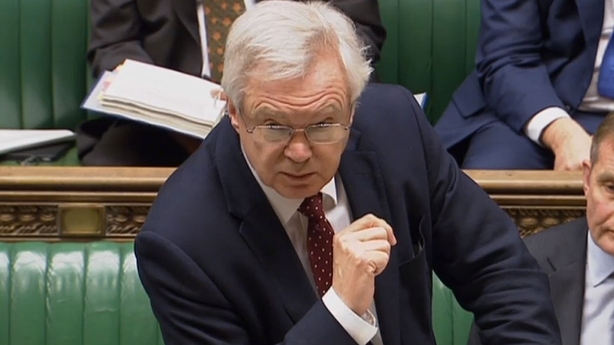The UK's Brexit Secretary has said that a positive outcome on trade discussions with the European Union would help progress the Irish border issue.
David Davis is to publish five position papers further setting out Britain's negotiating strategy next week in an attempt to add pace to the talks.
A paper published last Wednesday said avoiding check points or any other physical infrastructure on the Irish border is the UK government's number one priority when negotiating post-Brexit arrangements for its only land frontier with the EU.
A document on goods to be published next week will emphasise the government is seeking a deal to ensure the freest and most friction-less trade possible in goods and services.

At present, the EU's position is that only goods should be discussed in "phase one" of the negotiations, in which "sufficient progress" must be made before talks on a future trade deal can begin.
But Britain believes the goods and services sectors are impossible to separate and so wants to discuss them together.
Mr Davis (above) said: "With the clock ticking, it wouldn't be in either of our interests to run aspects of the negotiations twice."
Writing in the Sunday Times, Mr Davis said it is difficult to separate the issues of trade and the Irish border.
"It is simply not possible to reach a near final agreement on the border issue until we've begun to talk about how our broader future customs arrangement will work," he said.
"Furthermore, if we get the comprehensive free trade agreement we're seeking as part of our future partnership, solutions in Northern Ireland are easier to deliver."
Britain is to publish a number of other papers, focusing on the enforcement of European rulings, data sharing and confidentiality.
A key document is expected on the British government's favoured approaches to enforcing rights outside the jurisdiction of the European Court of Justice.
Disagreement over the ECJ's role was a major sticking point during July's round of talks, with the UK aghast at Brussels' insistence that EU citizens' rights should be enforced by the court after Brexit.
Next week's paper will set out different possible approaches to end the "direct jurisdiction" of the ECJ but still enforce individuals' and businesses' rights after Brexit.
Another position paper on confidentiality will make clear the government's intentions on ensuring official documents and information exchanged between the UK, EU and other member states remain protected after Brexit.
A document will also be published on civil judicial cooperation to reassure the domestic legal sector and with an eye on August's talks.
Finally, a paper on data will seek to ensure that it continues to be passed between the UK and EU without disruption.

